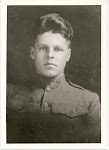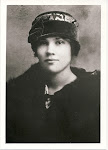November 11, 2010
November 11, 1918
There is not another letter to post until November 30th, yet I thought I should post a little something today--Armistice Day. "At the 11th hour of the 11th day of the 11th month" of 1918, hostilities ceased on the western front. Roy J. Diehl had only been overseas for a few months and had seen no action due to America's late entrance into the war. It must have been a joyous yet anticlimactic moment for American soldiers who hadn't made it to the front yet, but although they may not have taken part in the majority of the fighting, they did play a role in maintaining order following the peace agreement. They also had the opportunity to travel, which Roy J. Diehl took advantage of. You'll read his descriptions of the French Riviera in later letters.
Some things I did not learn in high school history (this could fill an entire book, but I'm keeping it specific to US and British involvement in WWI):
- the US tried very hard not to become involved in the war, instead attempting to mediate between opposing sides, and when congress at last declared war the move was rather unpopular. In fact, US involvement in the war was seen as a mistake by the majority of US citizens until Hitler's rise to power, when attitudes changed.
-WWI aided suffragettes in their cause. When women were needed to perform the duties of men away at war, governing bodies no longer had any semblance of a leg to stand on when it came to denying women the right to vote. Britain granted women the vote in 1918; the US was woefully behind and didn't grant it until 1920. For an amazing account of the struggle for voting rights and the bravery of women serving as nurses during the war, read Testament of Youth by Vera Brittain.
These are interesting tidbits to consider on a day meant to honor veterans, who were/are not always respected, and whose ranks included those women who fought for the vote and kept their composure in the face of injuries never seen before.
Some things I did not learn in high school history (this could fill an entire book, but I'm keeping it specific to US and British involvement in WWI):
- the US tried very hard not to become involved in the war, instead attempting to mediate between opposing sides, and when congress at last declared war the move was rather unpopular. In fact, US involvement in the war was seen as a mistake by the majority of US citizens until Hitler's rise to power, when attitudes changed.
-WWI aided suffragettes in their cause. When women were needed to perform the duties of men away at war, governing bodies no longer had any semblance of a leg to stand on when it came to denying women the right to vote. Britain granted women the vote in 1918; the US was woefully behind and didn't grant it until 1920. For an amazing account of the struggle for voting rights and the bravery of women serving as nurses during the war, read Testament of Youth by Vera Brittain.
These are interesting tidbits to consider on a day meant to honor veterans, who were/are not always respected, and whose ranks included those women who fought for the vote and kept their composure in the face of injuries never seen before.
Subscribe to:
Posts (Atom)


